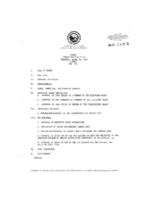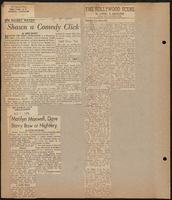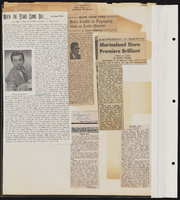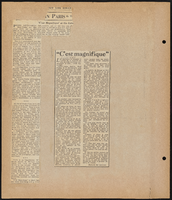Search the Special Collections and Archives Portal
Search Results
Las Vegas African American Community Conversations round table interviews
Identifier
Abstract
The Las Vegas African American Community Conversations is a four-part conversation with local Las Vegans. The first part of the round table is moderated by Trisha Geran with a central theme of "Migration, Work and Community Emergence." The panelists discuss the early history of the African American community in Las Vegas, Nevada. They also discuss how and why their families moved to Las Vegas, most citing the economic opportunities as a major factor. The participants share their personal histories and family histories building up the African American community in downtown Las Vegas and the Westside. The second part of the round table is moderated by Sonya Horsford with a central theme of "Education, Economy, and Integration." The panelists discuss the Clark County School District pre- and post-integration. They discuss the hardships of the Sixth Grade Center Integration Plan on the African American community as well as discussing the differences in the school facilities. The round table participants also discuss the social services and social programs and the history of those programs from the African American perspective. They also discuss civic involvement and the various civic groups started by the panelists, and share discrimination they faced.
The third part of the round table is moderated by Claytee D. White with a central theme of "Civil Rights and Entertainment." The panelists discuss the racism and segregation present in Las Vegas and discuss how African American community leaders worked to integrate African Americans into the Las Vegas community. They discuss the 1969 riots in detail, and discuss African American entertainers and the entertainment industry. They share personal experiences working in the entertainment industry and discuss the importance of the local unions, such as the Culinary Workers Union Local 226, the International Alliance of Theatrical Stage Employees Local 720, and their contributions to the unions. The fourth and final part of the round table is moderated by Rachel Anderson with a central theme of the "Early African American Legal Community." The panelists discuss the foundations of the professional legal community in Las Vegas, noting the contributions of Charles Keller, Dr. William Bailey, and the Reverend Marion Bennett as driving forces for civil rights activism in Las Vegas. They share their experiences growing up in Las Vegas facing discrimination and segregation. Lastly, they share the changes they have seen and how both the legal and African African communities have grown.
Archival Collection

Transcript of an interview with Chris Ramirez by Wendy Starkweather on October 2, 2013
Date
Archival Collection
Description
Text

Meeting minutes for Consolidated Student Senate University of Nevada, Las Vegas, April 26, 1990
Date
Archival Collection
Description
Text
Bezard, Pierre, 1924-2020
"Pierre was born June 16, 1924 in Paris, France. He survived WWII as a prisoner in a Nazi work camp where he met his lifelong friend Louis Juif. After the war, he returned to his family and began his career working backstage in theater. Although he never had much formal education, Pierre quickly ascended to the position of stage director, managing numerous productions including the Lido in Paris, Casino de Paris in Las Vegas, Ballet de Roland Petit, Solid Gold Las Vegas, Vive Les Girls, as well as touring shows worldwide.
Person
The Front Page, approximately 1927 to 1939
Level of Description
Scope and Contents
The Front Page sub-series (approximately 1927-1939) is comprised of materials pertaining to the production process of The Caddo Company's April 4, 1931 release of The Front Page. The sub-series contains advertising and publicity, administrative, financial, legal, and production and direction, and story development records. Director Lewis Milestone, along with editor Duncan Mansfield and writers Ben Hecht, Charles MacArthur, and Bartlett Cormack helped the film earn Academy Awards nominations for Best Director and Best Picture in 1929. The black-and-white photographic prints and negatives, primarily attributed to Newton Hopcroft, depict set and production stills of the principal and supporting cast and locations in the film.
Advertising and publicity records include newspaper clippings detailing the film’s release, articles of local advertising campaigns, and publicity stills of principal and supporting cast members. Administrative records include correspondence pertaining to the editing, censorship, and distribution of the film, as well as shipping receipts. Legal records include supporting actor and domestic distribution contracts. Production and direction records include production stills of principal and supporting cast, interior and exterior sets, and a sound and production daily report ledger. The story development records include production scripts, as well as cutting continuities and dialogue scripts for domestic and international releases.
Archival Collection
Collection Name: Howard Hughes Film Production Records
Box/Folder: N/A
Archival Component



